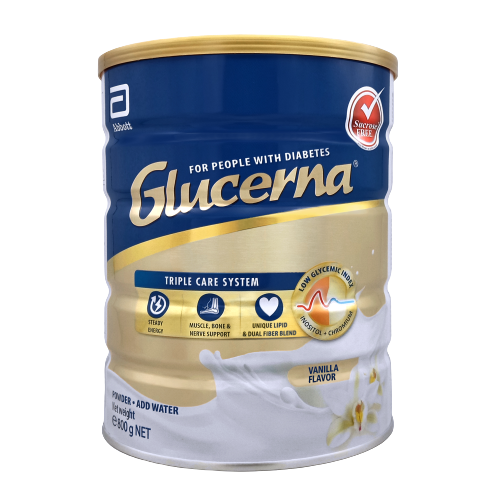Glucerna triple care
- Main Image
-

- Subtitle
- Complete and Balanced Nutrition For People with Diabetes
- Title
- Glucerna® Triple Care
- Detail Page Path
Every choice matters. Understand Glycemic Index (GI) to learn how you can make smarter carbohydrate choices to minimise blood glucose excursions!
Singapore is a food paradise, but the prevalence of cheap and delicious carbohydrate-rich food also makes the city-state a danger zone for people with diabetes. With so many delicious carbohydrate-rich choices available, it is hard to keep track of what we consume daily.
Every food choice you make can impact your blood sugar level — even if it’s low in sweetness. Get to know about Glycemic Index (GI) to better understand how your carbohydrate choices may impact your blood sugar.
Confused and troubled by fats in your diet? While fat is an essential nutrient, some types are healthier and others are associated with an increased risk of heart disease. We need to get to know the many fats and oils in our diet and make the right choices!
From our hearts to our brains, and even our skin, fats offer multiple benefits. Nevertheless, they should be consumed in moderation, especially if you have diabetes as individuals with diabetes have a higher risk for developing heart diseases. Here’s a simple primer to help you make better choices.
Unsaturated fats are a healthy type of fat. The American Heart Association (AHA) recommends that the majority of the fats that you eat should be monounsaturated or polyunsaturated. Thus, aim to replace less healthy options, with unsaturated fats like monounsaturated (MUFAs) and polyunsaturated fats (PUFAs).
MUFAs can help reduce ‘bad’ cholesterol levels in your blood, which in turn helps lower your risk of heart disease and stroke. For people with diabetes, research has also shown MUFA to benefit insulin levels and blood sugar control.1 Rich sources of MUFA include olive oil, nuts (e.g., almonds, cashews, pecans and macadamias), canola oil, and avocados.
The 2 main types of PUFAs are omega-6 polyunsaturated fats and omega-3 polyunsaturated fats. Research have shown that consumption of omega-3 can help improve blood cholesterol levels, which in turn may reduce the risk for heart disease. They are beneficial for people with diabetes, who are at risk for heart problems. Rich sources include fatty fish (e.g., salmon, sardine, and mackerel), seeds (e.g., flaxseeds, chia seeds), nuts (e.g., walnuts, pine nuts), avocados and dark green leafy vegetables (e.g., kale, spinach).
Despite the benefits, one should still only consume such ‘good’ fats in moderation as all fats, including MUFAs and PUFAs, are a concentrated source of calories. In general, the Singapore Health Promotion Board recommends that fat should make up about 25-30% of our total energy intake. Based on a typical 2000kcal diet, the total fat allowance is about 55 to 65g a day.
Saturated and trans fats are considered as ‘bad’.
Saturated fats elevate cholesterol levels, particularly LDL cholesterol and, thereby increase your risk of heart disease and stroke. Replacing foods that are high in saturated fat with healthier options can help lower blood cholesterol levels and improve blood lipid profile. Saturated fats occur naturally in many foods, especially meat and dairy products. Sources includes fatty beef, poultry with skin, butter, dairy products made from whole or reduced fat (2%) milk as well as fried foods. Palm and coconut oils are also common sources of saturated fat.
Trans fats raise ‘bad’ (LDL) cholesterol levels and ‘good’ (HDL) cholesterol levels and increases your risk of developing heart disease and stroke. There are two broad types of trans fats found in foods: naturally occurring and artificial trans fats. Natural occurring trans fats are found in small amounts in some meat and dairy. Artificial trans fats are found in processed foods such as butter, shortening and commercial deep-fried food and pastries. Avoid animal trans fats by reading food labels and look for partially hydrogenated vegetable oil or shortening in the ingredients list!
To eat a healthier diet, use less oil in your food and opt for steaming or baking instead. For your next meal in hawker centres, replace fried noodles with the soup version instead. Say no to the deep-fried banana fritters and switch to soybean pudding (less sugar!). If you want to step up the challenge, occasionally swap meat with beans for your protein.
Look out for foods that are tagged with the “Healthier Choice” symbol particularly those highlighted to be ‘Lower in Saturated Fat’ and ‘Trans Fat Free’. These will help you make smarter fat choices for your daily diet.
So many things to worry, so little time
Our bodies have lots of dietary requirements to meet, and sometimes it’s hard to fulfil all of them, especially if we have dietary restrictions due to conditions like diabetes. Always start small! If you are looking for a quick fix for individuals with diabetes, consider the use of a diabetes-specific formula. Such formulas are specially formulated to contain beneficial fats like MUFA and omega-3 and omega-6, while being low in Glycemic Index (GI). Being able to provide complete and balanced nutrition, it’s possibly the most convenient solution for a meal replacement or supplement without compromising on flavour or your health! Nonetheless, always consult your doctor or dietitian to carefully incorporate this in your diet.
So, remember, simple daily choices can make a big difference. Take a step in the right direction today!
Consult your doctor for a customised diabetes management plan.
Reference:
Qian F et al. Diabetes Care 2016;39:1448–1457
SG.2022.29988.GLU.1 (V1.1)
Stay Connected